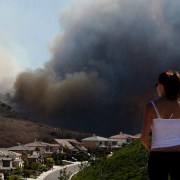 Photo: Getty Images
Photo: Getty Images
Smoke from wildfires can cause serious health concerns for people who have any kind of breathing disorder. Smoky air can also cause irritation that will make other allergies seem worse than normal. Smoke from wildfires can be caught in the jet stream and travel thousands of miles. That means your health could be at risk from a fire burning in another state.
Smoke allergies
People who are allergic to tree pollens may experience an actual allergy to smoke. Trees most likely to cause an allergic reaction include mesquite, oak, cedar, and hickory. An allergy is an inappropriate response from the body’s immune system to something that is not normally harmful. When an allergen contacts the body, the immune system sends out a warning that triggers the release of antibodies to fight off the invader. Histamine is one of the most common triggers that cause many of the symptoms we associate with an allergy attack including a runny nose and red, itchy, or watery eyes.
Who is at risk?
In addition to people with smoke allergies, these people may also be at risk from wildfire smoke:
• Seniors – older lungs are not as efficient as they were when they were younger, so older people may have a harder time breathing in a smoky area.
• Pregnant women and young children – these groups breathe in more air per pound of body weight than others, so they can be affected by smoke more quickly.
• Respiratory conditions – people with asthma, COPD, emphysema, and heart disease may be at higher risk of serious breathing difficulties due to smoke.
• Colds or flu – people with respiratory infections will have a harder time breathing when air is smoky.
Smoke symptoms
Wildfire smoke can cause some immediate symptoms including irritation of the eyes and nose, coughing, and a sore throat. If you have trouble breathing or have tightness in your chest, get medical help. Continued exposure to smoky air will only make these symptoms worse. Exposure lasting several days or weeks can also stress the body’s immune system and make it more likely that you could catch a cold or other illness.
Protect yourself from smoke
If you have asthma or other serious respiratory conditions and you know you are at risk from smoke exposure, consider leaving the area if it is possible to do so. If you must stay in a smoky environment, try these tips to limit smoke exposure:
• Stay indoors – close the windows and doors to keep out as much smoke as possible. Run the air conditioner or swamp (evaporative) cooler only if it has filters, and make sure the filters are kept clean. Running air conditioning or using the heater in “fan only” mode if the unit is not filtered can bring more smoke into your home rather than adding protection.
• Find filtered air – Malls, restaurants, and movie theaters are just a few public locations where the air will be filtered.
• HEPA filters – if you have an air filter that uses high efficiency particulate air filters, be sure to use it.
• Limit activity – avoid exercise or other activities that will increase your rate of breathing. If smoke is heavier at certain times of day, plan activities for times when there is less smoke.
• Stay healthy – eat nutritious meals and drink plenty of fluids to help your body stay healthy.
Even if you are not allergic to smoke, the irritants in the air can make you more susceptible to other allergens. Avoid your allergens as much as possible to limit allergy symptoms. If you have asthma, talk to your doctor if your control plan is not working and make sure you have your rescue medications handy.
Sources:
Colorado Department of Public Health
About.com: Allergies
eHow Health
About.com: Barbeque smoke allergy
Reviewed June 9, 2011
Edited by Alison Stanton






Add a CommentComments
There are no comments yet. Be the first one and get the conversation started!